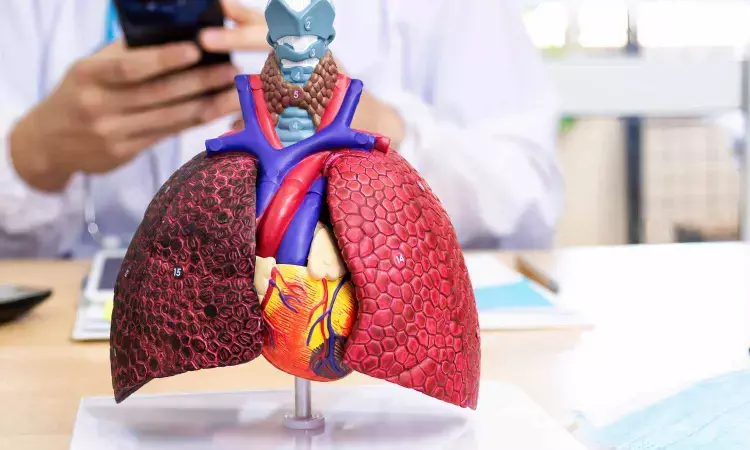- Home
- Medical news & Guidelines
- Anesthesiology
- Cardiology and CTVS
- Critical Care
- Dentistry
- Dermatology
- Diabetes and Endocrinology
- ENT
- Gastroenterology
- Medicine
- Nephrology
- Neurology
- Obstretics-Gynaecology
- Oncology
- Ophthalmology
- Orthopaedics
- Pediatrics-Neonatology
- Psychiatry
- Pulmonology
- Radiology
- Surgery
- Urology
- Laboratory Medicine
- Diet
- Nursing
- Paramedical
- Physiotherapy
- Health news
- Fact Check
- Bone Health Fact Check
- Brain Health Fact Check
- Cancer Related Fact Check
- Child Care Fact Check
- Dental and oral health fact check
- Diabetes and metabolic health fact check
- Diet and Nutrition Fact Check
- Eye and ENT Care Fact Check
- Fitness fact check
- Gut health fact check
- Heart health fact check
- Kidney health fact check
- Medical education fact check
- Men's health fact check
- Respiratory fact check
- Skin and hair care fact check
- Vaccine and Immunization fact check
- Women's health fact check
- AYUSH
- State News
- Andaman and Nicobar Islands
- Andhra Pradesh
- Arunachal Pradesh
- Assam
- Bihar
- Chandigarh
- Chattisgarh
- Dadra and Nagar Haveli
- Daman and Diu
- Delhi
- Goa
- Gujarat
- Haryana
- Himachal Pradesh
- Jammu & Kashmir
- Jharkhand
- Karnataka
- Kerala
- Ladakh
- Lakshadweep
- Madhya Pradesh
- Maharashtra
- Manipur
- Meghalaya
- Mizoram
- Nagaland
- Odisha
- Puducherry
- Punjab
- Rajasthan
- Sikkim
- Tamil Nadu
- Telangana
- Tripura
- Uttar Pradesh
- Uttrakhand
- West Bengal
- Medical Education
- Industry
HF therapy guided by wearable devices effective in reducing mortality: Study

A new study published in the Frontiers in Cardiovascular Medicine showed that wearable technology for monitoring pulmonary congestion in heart failure (HF) patients decreased the risk of both hospitalization and mortality by 37%.
Hospitalizations for HF have a considerable predictive impact. They are expensive, intrusive, and have no discernible mortality benefit, yet, implanted hemodynamic monitors can identify early congestion.
Although it may not be a reliable indicator of decompensation, body weight is frequently tracked as an outpatient for the onset of congestion. An alternative to intrusive methods of monitoring traffic is provided by wearable technology. Therefore, in comparison to conventional therapy, this meta-analysis was carried out to investigate the effectiveness of wearable devices in lowering HF hospitalizations and death.
PRISMA criteria were followed in conducting a systematic review and meta-analysis. Trials comparing wearable device-guided care with conventional HF therapy were found by searching the PubMed, MEDLINE, EMBASE, and Cochrane databases.
Hospitalization for heart failure, worsening heart failure events (hospitalization or ED visit for heart failure), and all-cause death were among the outcomes. Random effect models were used to do meta-analyses of total (first and recurring) events.
All the 958 individuals who were enrolled at the time of or within 10 days after being discharged from a hospitalization for heart failure were included in 4 trials that satisfied the inclusion criteria.
When compared to standard treatment, wearable device-guided therapy led to a 40% decrease in HF occurrences (RR: 0.60, 95% CI: 0.42–0.86, p = 0.005) and a 41% decrease in hospitalizations for HF (RR: 0.59, 95% CI: 0.41–0.87, p = 0.007).
The wearable monitoring arm saw a 26% decrease in all-cause mortality (RR: 0.74, 95% CI: 0.55–0.99, p = 0.04).
Wearable monitoring resulted in a 37% reduction in the composite outcome of HF hospitalization and death (RR: 0.63, 95% CI: 0.44–0.91, p = 0.04).
All-cause mortality and HF hospitalizations were decreased in newly admitted patients when treatment for HF was directed by wearable technology that measures pulmonary congestion.
Overall, across the range of EF, HF therapy guided by wearable devices that identify pulmonary congestion decreased HF hospitalizations and mortality. When transferring treatment from the acute to the home environment, wearable monitoring may offer more protection against unfavorable outcomes. This approach proved successful in patients with characteristics indicating a worse prognosis, such as a recent hospitalization.
Reference:
Murray, C. P., Kenny, A. P., O’Sullivan, N. J., Murphy, R. T., & Curtain, J. P. (2025). Efficacy of wearable devices detecting pulmonary congestion in heart failure: a systematic review and meta-analysis. Frontiers in Cardiovascular Medicine, 12, 1612545. https://doi.org/10.3389/fcvm.2025.1612545
Neuroscience Masters graduate
Jacinthlyn Sylvia, a Neuroscience Master's graduate from Chennai has worked extensively in deciphering the neurobiology of cognition and motor control in aging. She also has spread-out exposure to Neurosurgery from her Bachelor’s. She is currently involved in active Neuro-Oncology research. She is an upcoming neuroscientist with a fiery passion for writing. Her news cover at Medical Dialogues feature recent discoveries and updates from the healthcare and biomedical research fields. She can be reached at editorial@medicaldialogues.in
Dr Kamal Kant Kohli-MBBS, DTCD- a chest specialist with more than 30 years of practice and a flair for writing clinical articles, Dr Kamal Kant Kohli joined Medical Dialogues as a Chief Editor of Medical News. Besides writing articles, as an editor, he proofreads and verifies all the medical content published on Medical Dialogues including those coming from journals, studies,medical conferences,guidelines etc. Email: drkohli@medicaldialogues.in. Contact no. 011-43720751


